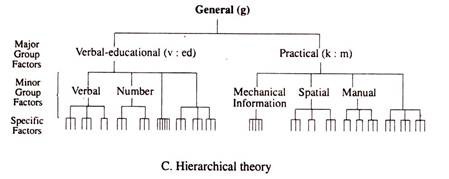INTELLIGENCE THEORY OF STERNBERG....
Robert Sternberg (1988, 2004) is a leading proponent of the cognitive processes approach to
intelligence. He theorized that intelligence is a fixed capacity of a person. This theory emphasizes
what he called Successful Intelligence or “the ability to adapt to shape, and select environment to
accomplish one’s goals and those of one’s society and culture”(Sternberg & Kaufman, 1998) His
triarchic theory of intelligence addresses both the psychological processes involved in intelligent
behaviour and the diverse forms that intelligence can take. Sternberg’s theory divides the cognitive
processes that underlie intelligent behavior into three specific components:
Metacomponents are the higher-order processes used to plan and regulate task performance. They
include problem-solving skills such as identifying problems, formulating hypotheses and strategies,
testing them logically, and evaluating performance feedback. Sternberg believes that
metacomponents are the fundamental sources of individual differences in fluid intelligence. He finds
that intelligent people spend more time framing problems and developing strategies than do less
intelligent people, who have a tendency to plunge right in without sufficient forethought.
Performance components are the actual mental processes used to perform the task. They include
perceptual processing, retrieving appropriate memories and schemas from long-term memory, and
generating responses. Finally, knowledge acquisition components allow us to learn from ourexperiences, store information in memory, and combine new insights with previously acquired
information. These abilities underlie individual differences in crystallized intelligence. Thus
Sternberg’s theory addresses the processes that underlie the distinction made by Cattell and Horn
between fluid and crystallized intelligences.
Sternberg believes that there is more than one kind of intelligence. He suggests that environmental
demands may call for three different classes of adaptive problem solving and that people differ in
their intellectual strengths in these areas:
1. Analytical intelligence involves the kinds of academically oriented problem-solving skills
measured by traditional intelligence tests.
2. Practical intelligence refers to the skills needed to cope with everyday demands and to manage
oneself and other people effectively.
3. Creative intelligence comprises the mental skills needed to deal adaptively with novel problems.
Sternberg has shown that these forms of intelligence, while having a modest underlying g factor, are
also distinct from one another. Consider, for example, the relation between academic and practical
skills. In one study, adolescents in Kenya were given one set of analytical tests measuring traditional
academic knowledge and another set measuring their knowledge of natural herbal medicines used
to treat illnesses, a kind of practical knowledge viewed by villagers as important to their survival. The
results indicated that the practical intelligence measure of herbal knowledge was unrelated to (and
sometimes negatively correlated with) the academic measures (Sternberg et al., 2001).
Sternberg also found that Brazilian street children were very proficient at the math required to carry
on their street businesses, despite the fact that many of them had failed mathematics in school
(Sternberg, 2004).
Sternberg believes that educational programs should teach all three classes of skills, not just
analytical-academic skills. In studies with elementary school children, he and his colleagues have
shown that a curriculum that also teaches practical and creative skills results in greater mastery of
course material than does a traditional analytic, memory-based approach to learning course content
(Sternberg et al., 1998). As Sternberg’s work illustrates, cognitive science is leading us to a focus on
understanding and enhancing the mental processes that underlie intelligent behavior.
#Sternberg (1988) proposed the concept of 'mental self government' which represents an
attempt to combine intelligence with personality.
#The manner in which three types of intelligence of the triarchic theory, are brought to bear
in solving everyday life problem is characterized as 'Intellectual Style‘.
# The effectiveness of a particular intellectual style depends on the context to which it matches a person's intellectual ability , her or her preferred style and the immediate problem to be solved. (Sternberg, 2003)
# A recent entry in intellectual testing sweepstakes is Sternberg Triarchic Ability Test (STAT) , a battery of multiple choice item designed to measure the analytic, practical and creative aspects of intelligence.











